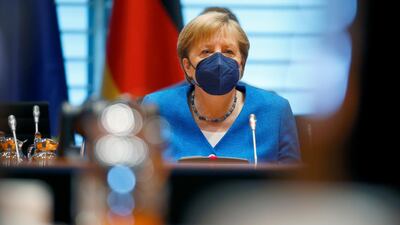German Chancellor Angela Merkel has received a Moderna coronavirus vaccine as her second shot, after getting AstraZeneca as the first.
Ms Merkel, 66,took her first dose of AstraZeneca's vaccine in April, more than two weeks after German authorities first recommended it for people aged 60 and over.
Germany had initially restricted the AstraZeneca vaccine to people under 60 because of concerns over its efficacy in older people.
Another concern over possible blood clots in younger people prompted Germany to recommend that people under 60 who had already received a first dose of AstraZeneca should have a different vaccine for their second shot.
Ms Merkel is not in that age group but still decided to mix her vaccines.
Some experts believe mixing vaccines could be more effective but as yet there has been little research on this.
However, one study in the UK found people mixing AstraZeneca and Pfizer Covid vaccines were more likely to experience mild or moderate side effects.
Several countries are looking at mixing vaccines because of supply shortages.
After a stuttering start, Germany's vaccination programme has accelerated in recent weeks. One in two, or 51.2 per cent of the population, have received their first dose.
About 26 million people are fully vaccinated, accounting for 31 per cent of the population.
Two doses are seen as essential to withstand the threat of the Delta variant of Covid-19, which is gaining ground in Germany after spreading rapidly in Britain.
Ms Merkel said she hopes that as vaccination efforts progress in the EU, there will be better co-ordination on pandemic travel rules among the bloc's 27 member states.
After the rapid spread of the highly contagious Delta variant, Ms Merkel said it was problematic to have a patchwork of regulations.
"I regret that we haven't managed yet to have completely uniform action among the member states on travel guidelines – that is coming back to haunt us," she said.
She cited the example of Portugal, where the government was forced to slow the process of post-lockdown reopening in Lisbon and three other municipalities after an increase in the number of new Covid-19 cases.


